How to spot impersonation scams on WhatsApp: Watch out for unexpected messages claiming to be from someone you know, especially if they urgently request money or personal information. If you can’t verify the sender’s identity through another communication channel, it’s a scam.
That innocent “ping” from your phone may be more dangerous than you think. Behind WhatsApp’s familiar green chat bubbles, scammers can lie prepped and ready to exploit your trust, steal your information, and drain your bank account.
These fraudsters employ clever social engineering tactics to steal personal information, commit identity theft, install malware, or trick you into sending money. Here’s a breakdown of 15 common WhatsApp scams to watch for and how to protect yourself.
1. Impersonation scams
Impersonation scams on WhatsApp involve fraudsters pretending to be someone you know, like a friend, colleague, or family member (commonly known as a Mom and Dad scam). They might claim to have a new phone number or even spoof an existing one, creating an urgent scenario that requires financial assistance. Scammers often use stolen profile pictures to appear more convincing.
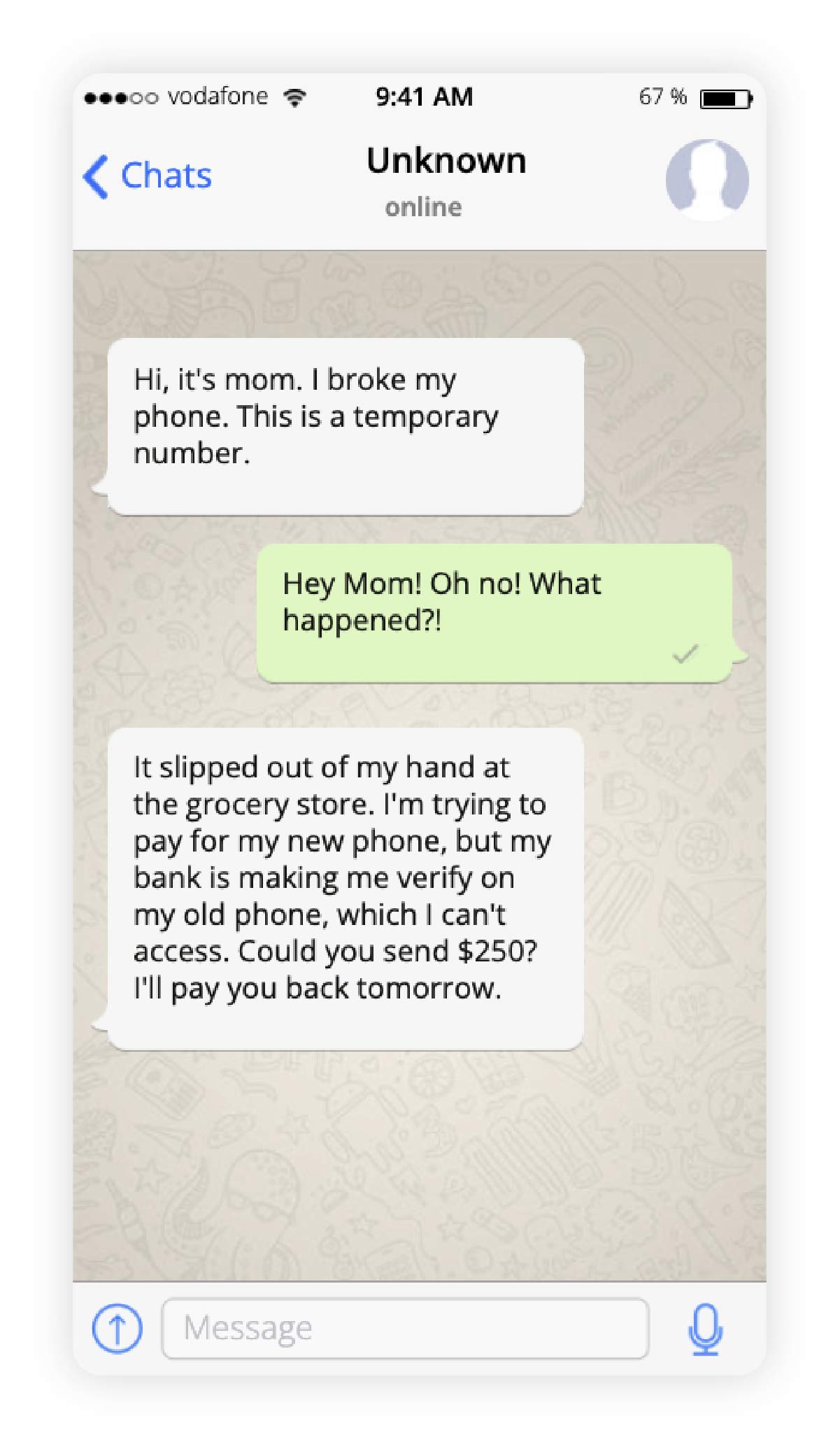

A 2024 WhatsApp impersonation scam in India involved cybercriminals sending fake wedding invitations that appeared legitimate but contained malicious APK files. If a user downloaded and installed the files, malware was installed on their device, which granted hackers access to sensitive personal data and even allowed them to facilitate financial fraud.
2. Romance scams
WhatsApp romance scams typically begin on dating apps or social media platforms, such as Snapchat or Instagram, with scammers quickly moving conversations to WhatsApp to build connections outside platform safety measures.
As long as people seek relationships online, WhatsApp dating scams will continue to flourish. These scammers establish emotional bonds before fabricating emergencies requiring financial help, such as travel expenses for a planned meeting or funds for a sudden crisis.
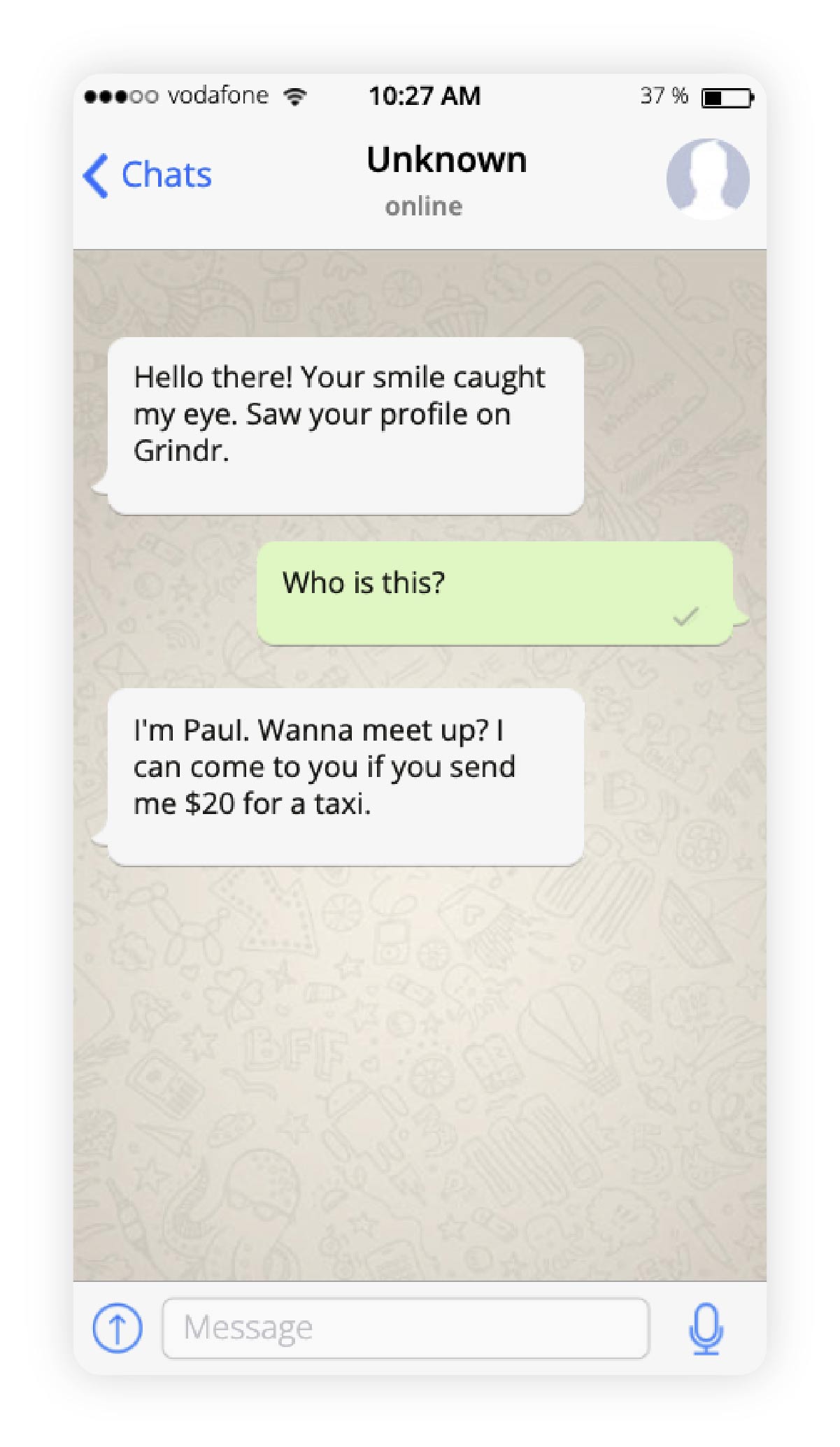

How to avoid romance scams on WhatsApp: Relationships that progress unusually quickly can be a sign of a scam. Be wary if the person you’re talking to avoids video calls or in-person meetings, or repeatedly requests financial assistance.
3. Lottery or prize draw scams
In WhatsApp lottery or prize draw scams, you receive an unexpected message claiming you’ve won a significant prize, often from seemingly reputable companies. To claim your supposed winnings, scammers request personal details or demand “processing fees” upfront. These messages typically create false urgency, pressuring quick action before you have time to verify legitimacy.


How to avoid a WhatsApp prize scam: If you receive a text saying you won a prize for a competition or sweepstakes you never entered, ignore it. There’s a high chance it’s a scam. Legitimate lotteries never require upfront fees to claim winnings.
4. Job scams
WhatsApp job scams (also known as employment scams) feature fake recruiters offering unsolicited positions with attractive salaries and benefits. While some job scams may originate on LinkedIn or other job-hunting platforms, part of the ruse is often that the recruiter requests to chat via WhatsApp for more direct communication.
Fraudulent “recruiters” may then request payment for training materials or equipment to steal your money. Or, they’ll collect sensitive information like Social Security numbers under the guise of completing employment paperwork, setting the stage for identity theft.
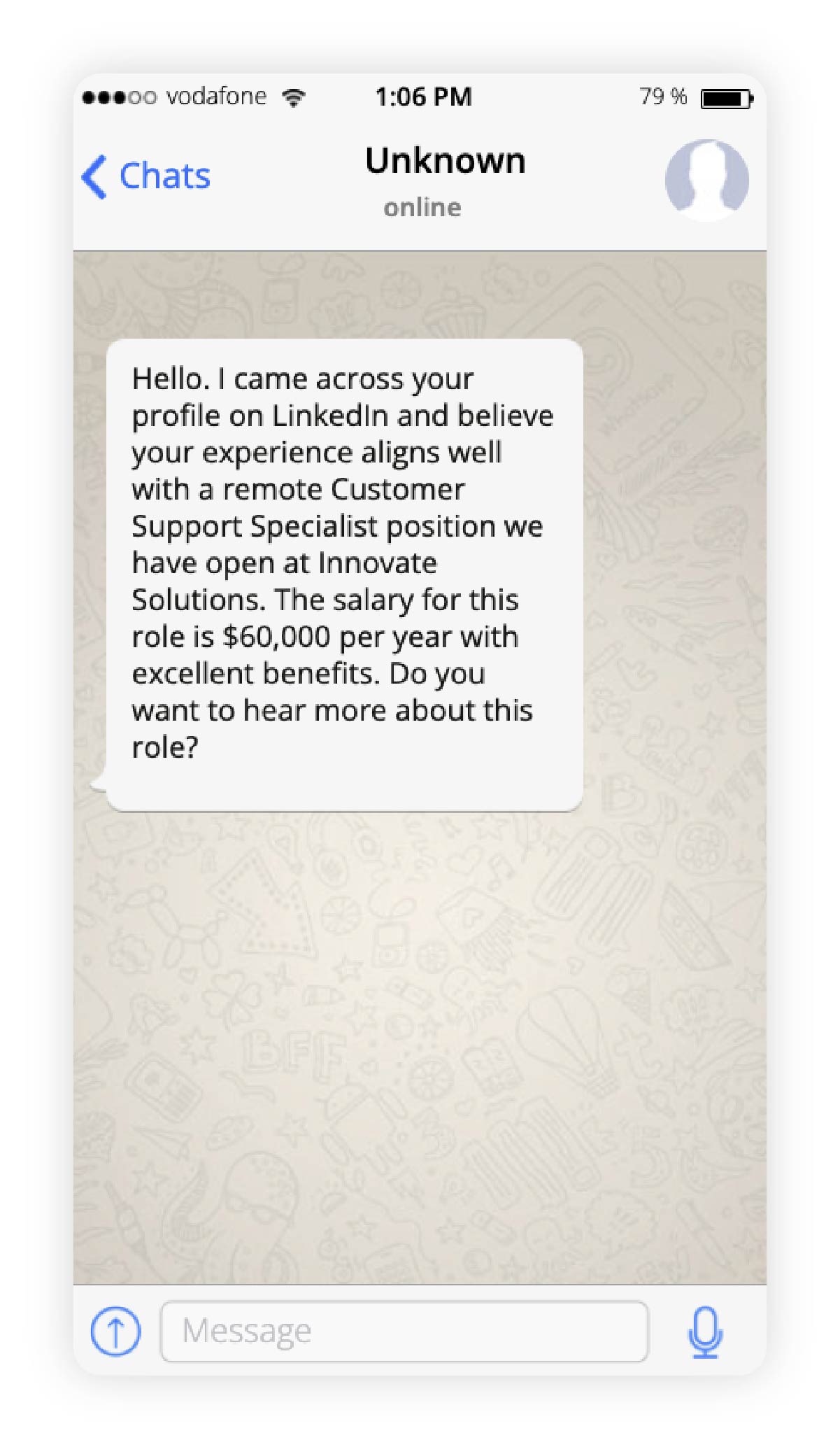

How to avoid job scams over WhatsApp: Question offers that seem too good to be true, especially from unknown contacts requiring upfront fees or requesting sensitive personal information early in the hiring process. Keep all communication on professional channels, such as email or the job site where you found the role.
5. WhatsApp Gold scams
The WhatsApp Gold scam promotes a non-existent “premium” version of the app with exclusive features. Messages entice users with promises of enhanced functionality, like unlimited media sharing and special filters. The “invitation” typically includes a link to a malicious website designed to harvest personal information or install malware.


How to avoid WhatsApp Gold scams: Remember that WhatsApp only offers one official version through legitimate app stores, and it’s free (though some data charges may apply). Any message promoting premium variants is automatically fraudulent.
6. WhatsApp verification code scams
WhatsApp verification code scams exploit the app’s security system. A scammer attempts to log into your account using your phone number, triggering a legitimate verification code sent via SMS. They then contact you, often posing as a friend who “accidentally” requested the code, or can’t use their own phone at the moment, and needs you to share the code sent to your number. But, providing this code grants the scammer full access to your account.
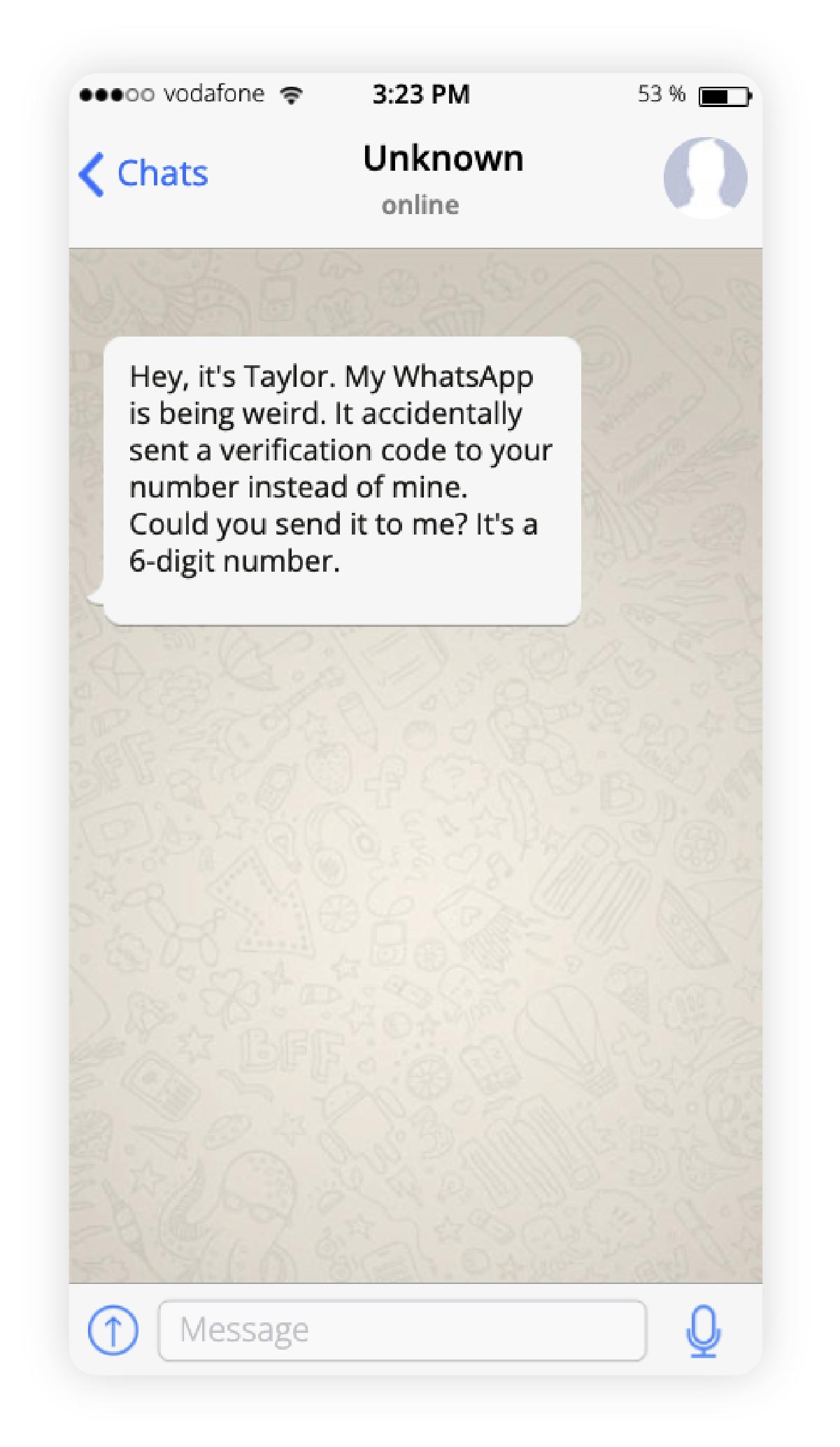

How to avoid WhatsApp verification code scams: Never share verification codes with anyone, regardless of who they claim to be. These codes are meant solely for your personal use.
7. Gift card scams
Gift card scams on WhatsApp involve unsolicited messages offering free cards or discounts from popular retailers in exchange for completing surveys or clicking links. These deceptive offers trick you into downloading malware onto your device or providing personal data that could be used for identity theft.


How to avoid gift card scams on WhatsApp: Legitimate companies rarely distribute free, unsolicited gift cards through messaging apps. If an offer seems too generous, it’s likely a scammer attempting to collect your data.
8. Charity scams
In WhatsApp charity scams, fraudsters exploit people’s generosity by impersonating legitimate charities or creating fake ones, especially during crises or disasters. They send urgent pleas for donations using social engineering tactics, like emotional language and fabricated stories, to pressure you into sending immediate financial support. These funds rarely reach any actual beneficiaries.
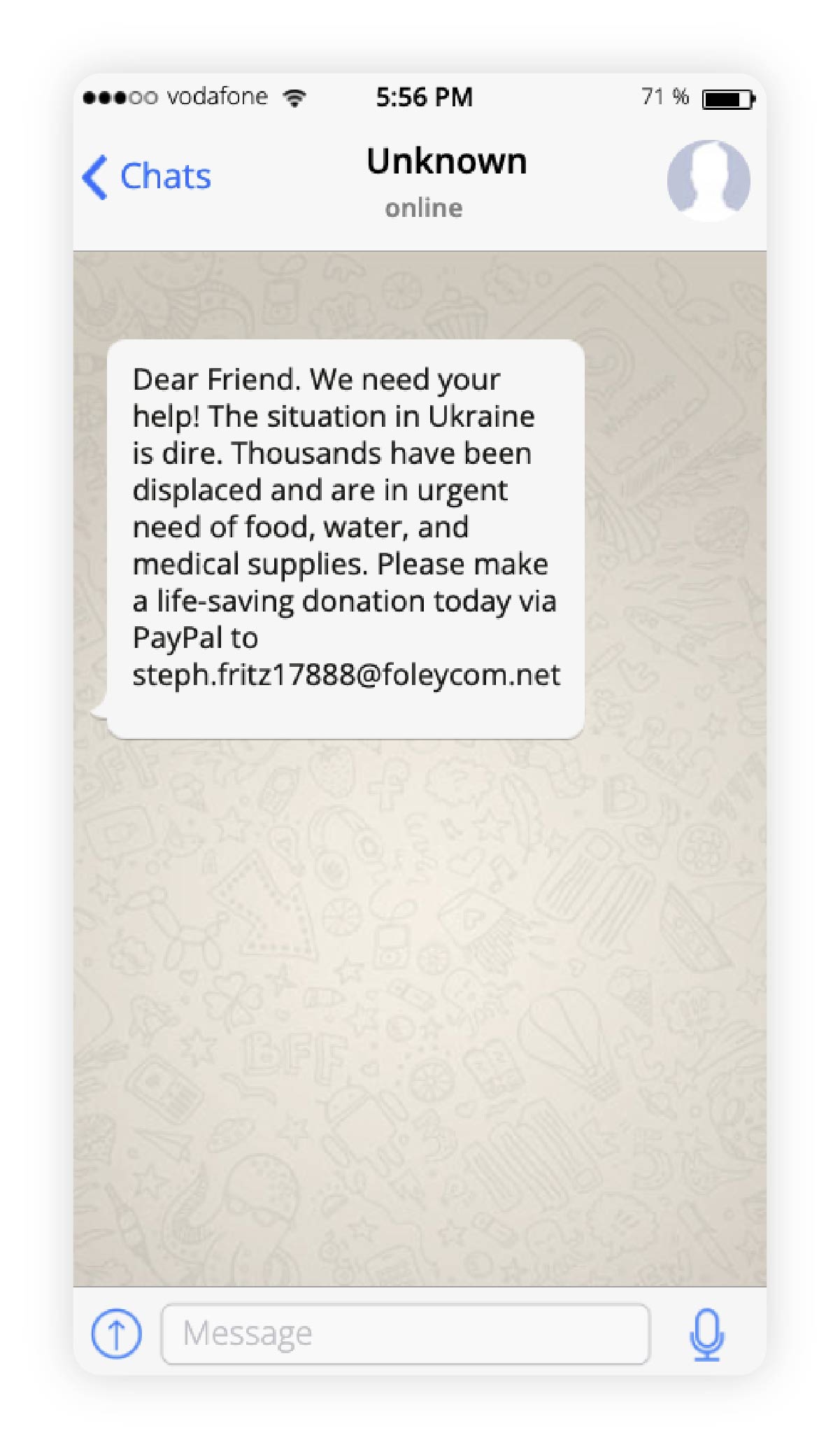

How to avoid charity scams on WhatsApp: Reputable organizations typically don’t solicit donations through WhatsApp messages out of nowhere. Navigate to an organization’s website to verify legitimacy before donating.
9. WhatsApp tech support scams
WhatsApp tech support scams involve individuals impersonating official WhatsApp staff who claim there’s a security issue with your account. They try to extract sensitive information like login credentials or verification codes or guide you to install remote access software, giving them control over your device.
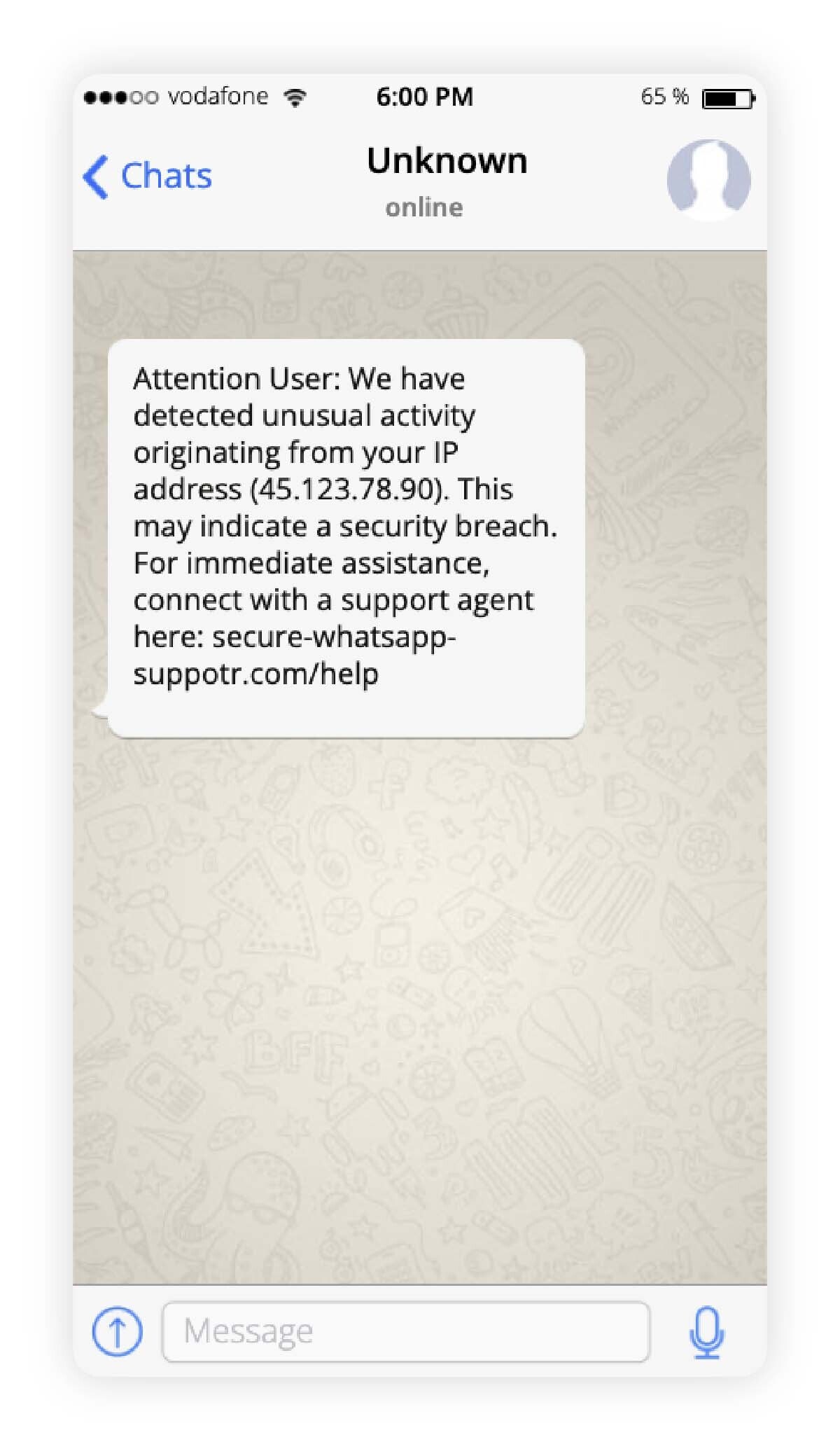

How to avoid WhatsApp tech support scams: Official WhatsApp support never initiates contact through the app itself. Ignore any message claiming to be from WhatsApp technical support, as it’s likely fraudulent.
10. Call forwarding scams
WhatsApp call forwarding scams aim to intercept your calls and messages, including sensitive information like two-factor authentication codes. Scammers use social engineering tactics to trick you into dialing specific codes (i.e., *21[scammer’s number]#) that unknowingly forward your calls to their number. This provides them access to your accounts and personal data.
For example, they might impersonate customer support and claim you need to dial a code to fix a security issue. Alternatively, they could send a fake urgent request from a compromised contact asking you to dial a code for an innocent-sounding reason.
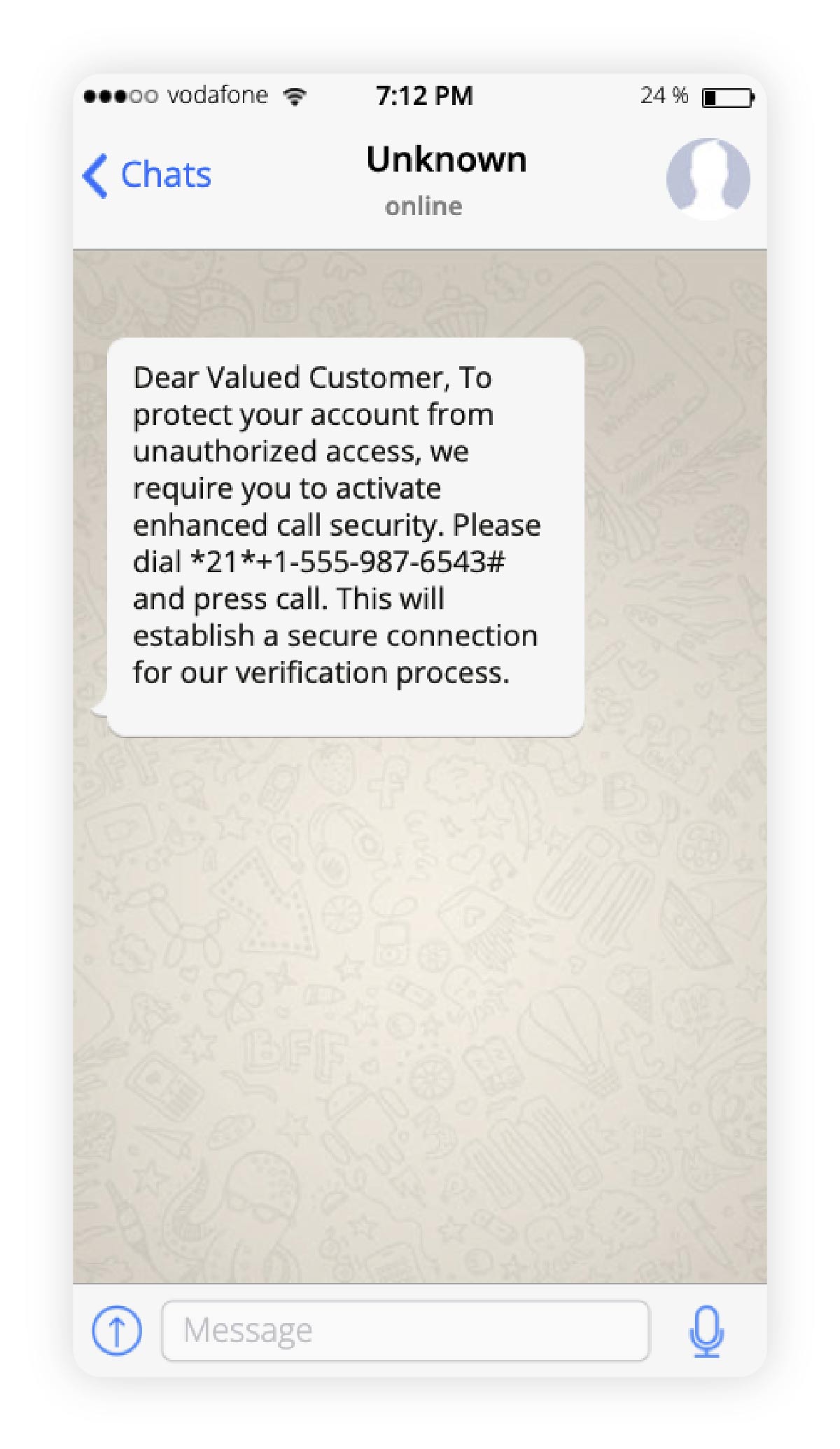

How to avoid WhatsApp call forwarding scams: Be suspicious of anyone requesting that you dial unfamiliar codes, especially those beginning with asterisks or pound signs, as these can manipulate your phone’s call settings.
11. QR Code scams
QR code scams on WhatsApp involve scammers sending deceptive QR codes, often claiming they’re for special offers or connections. Scanning these codes can lead to malicious websites that steal information or initiate unauthorized payments without your knowledge.
How to avoid WhatsApp QR code scams: Don’t scan or tap any QR codes sent to you in unsolicited WhatsApp messages. Only scan QR codes from trusted sources, and even if a trusted contact sends one, verify with them independently.
12. Crypto scams
WhatsApp crypto scams promote fake cryptocurrency investment opportunities with promises of extraordinary returns and minimal risk. Scammers use fake testimonials and professional-looking websites to appear legitimate while pressuring people into quick investment decisions.
Due to the nature of cryptocurrency and blockchain technology, once you send funds, recovery is nearly impossible. Crypto scams often take the form of WhatsApp investment group scams where multiple victims are targeted simultaneously.


How to avoid WhatsApp crypto scams: Be skeptical of unsolicited investment opportunities, especially those promising guaranteed high returns or requiring immediate action. Legitimate investments don’t rely on high-pressure tactics.
13. Investment scams
Beyond crypto, various investment scams circulate on WhatsApp involving fake stocks, bonds, or “exclusive opportunities”. Scammers often add users to unsolicited WhatsApp groups filled with fake testimonials and discussions designed to create a sense of legitimacy and “can’t-miss” potential.
Scammers use fabricated success stories and artificial urgency to pressure quick investment decisions. They may initially provide small “profits” to gain trust before disappearing with larger investments.
A recent investment scam involved fraudsters impersonating Nick Train, a well-known fund manager. Scammers created fake WhatsApp profiles using his name and image to contact individuals, offering bogus investment opportunities. These messages often promised high returns and insider tips to lure unsuspecting investors. This demonstrates how scammers leverage the credibility of public figures to gain trust and perpetrate fraudulent schemes on WhatsApp.
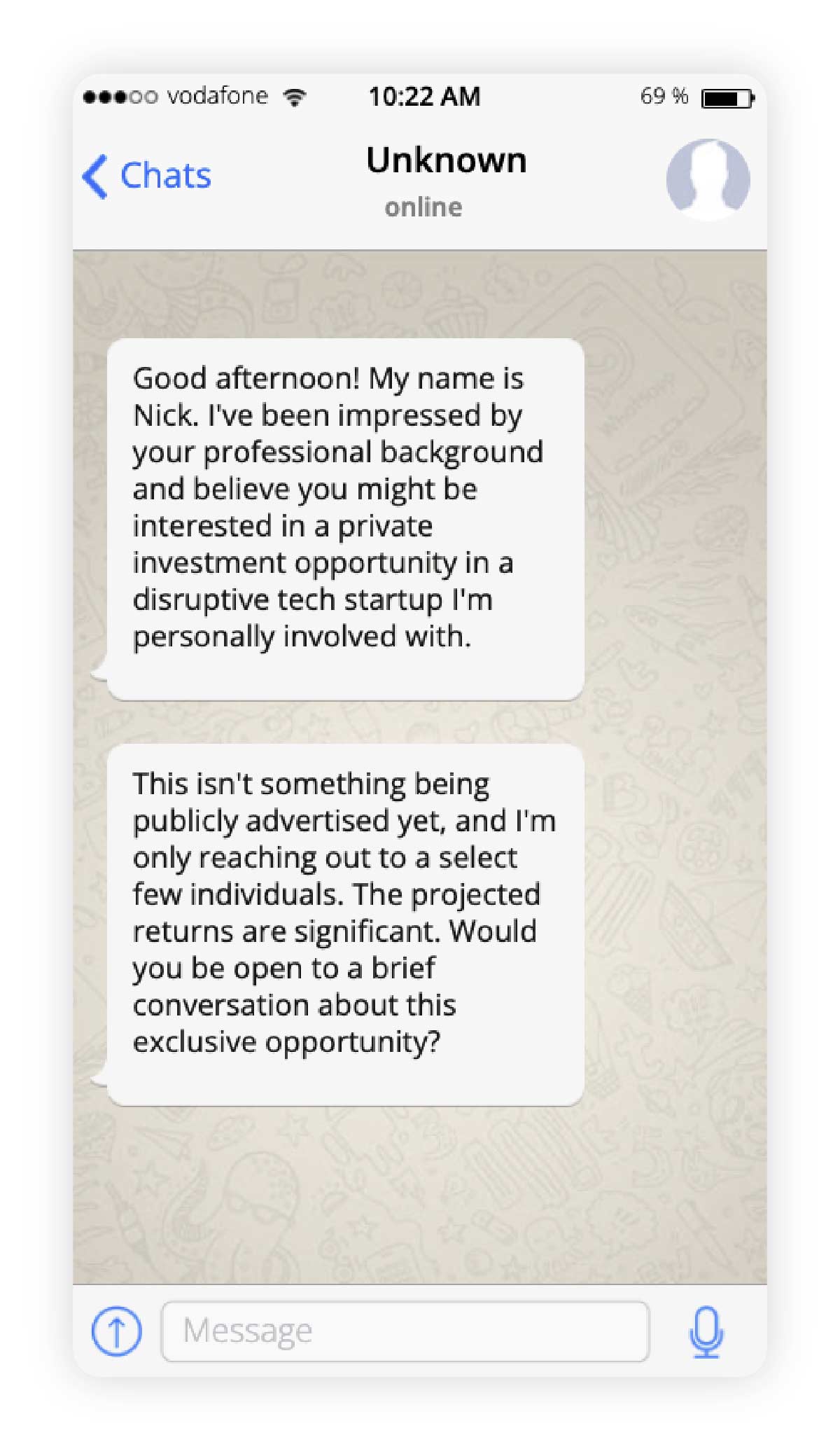

How to avoid investment scams on WhatsApp: Never engage with unsolicited investment requests. Consult licensed financial advisors about investments you’re unsure of, and remember that legitimate investments don’t require rushed decisions or secretive transfers.
14. Real estate scams
WhatsApp real estate scams feature fake property listings with suspiciously low prices. They will then typically provide a WhatsApp number as the primary contact method or directly message you on WhatsApp if you’ve shown interest in a listing elsewhere.
Scammers pose as agents for landlords that “live abroad” or as landlords that are in a hurry to rent and quickly request upfront deposits or application fees before you have the opportunity to view the property. They may also demand personal information and documents for supposed background checks, which they then use to commit identity theft.
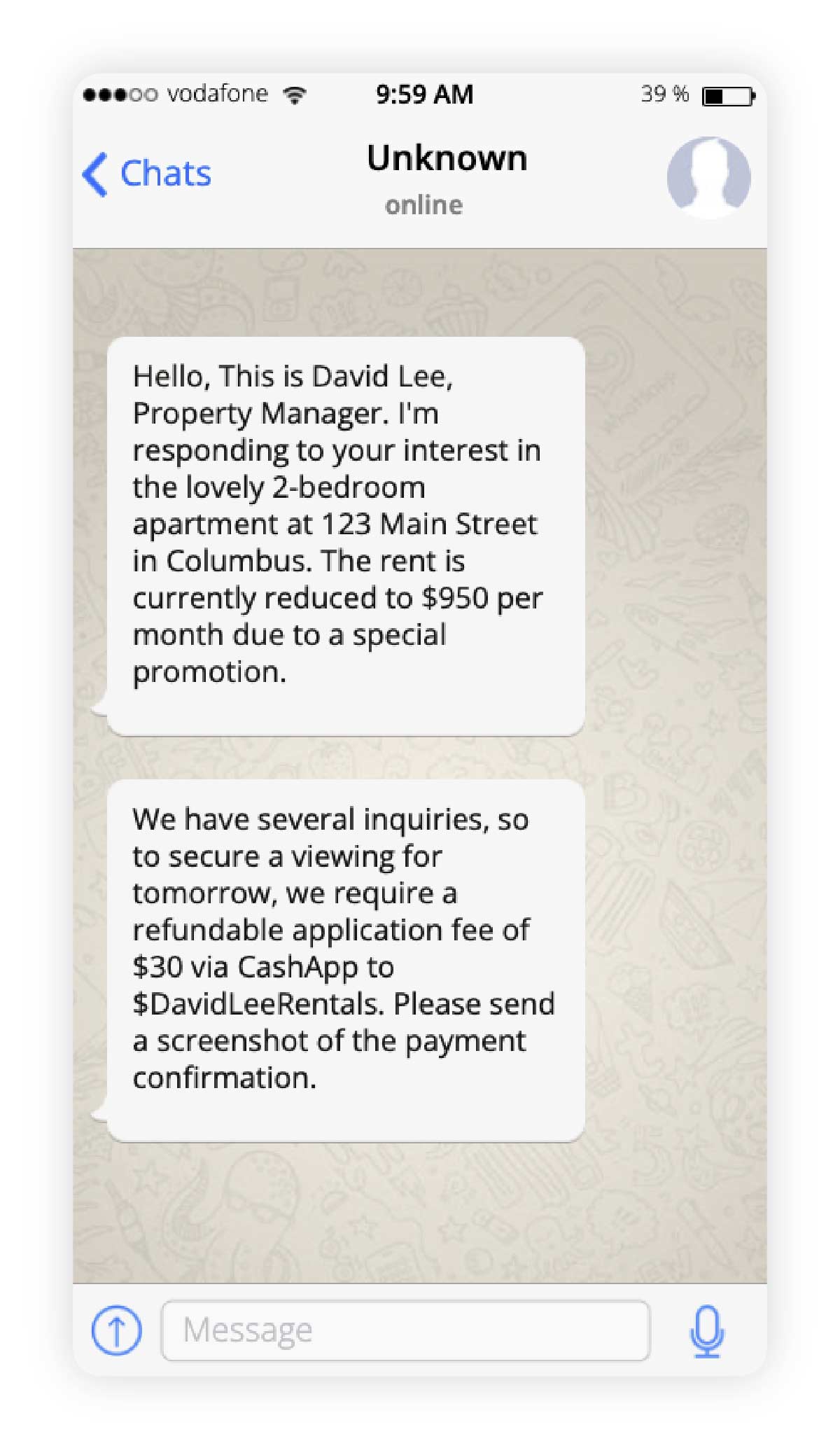

How to avoid WhatsApp real estate scams: Never send money or personal documents before physically viewing a property. Verify the legitimacy of the listing through official channels.
15. Fake app scams
Fake WhatsApp app scams trick users into downloading counterfeit versions of the application. Scammers may reach out to you directly on WhatsApp with a link to download a fake app, perhaps disguised as a new game or a modified version of WhatsApp. Or, you may come in contact with fake versions of WhatsApp directly.
Scammers distribute malicious copies through unofficial app stores, third-party websites, or phishing links. Once installed, they can deploy malware or steal login credentials and private information.
How to avoid fake WhatsApp scams: Download WhatsApp exclusively from official app stores (Google Play Store or Apple App Store). Be wary of links claiming to offer an alternative version of the app.
How to tell if a WhatsApp message is a scam
The most obvious way to tell that a WhatsApp message is a scam is if you receive unsolicited messages or requests for money, like unexpected messages from unknown numbers asking for urgent financial help or claiming you’ve won a prize.
Recognizing the following red flags is crucial in identifying potential WhatsApp scams:
- Unsolicited messages from unknown numbers: Getting a WhatsApp message from a stranger is a major red flag that it’s a scam.
- Requests for money or sensitive information: Legitimate organizations rarely ask for personal or financial details through WhatsApp, especially urgently.
- Requests for verification codes: Unless you’re actively trying to sign into an account, treat login verification codes and requests for them as scam messages.
- Suspicious links or attachments: Clicking unexpected links and attachments could lead to phishing sites or malware. Also check for shortened URLs, which scammers use frequently in WhatsApp scams.
- Manufactured urgency: Scammers create artificial time pressure to force quick, irrational responses.
- Changes in contact behavior: If a known contact’s messaging style suddenly changes or they make unusual requests, their account may be compromised.
- Unexpected prize notifications: Messages claiming you’ve won something, like Publishers Clearing House scams, are likely scams — especially when you didn’t enter in the first place.
- Messages about features requiring login information: WhatsApp updates automatically or prompts you within the official app, not through direct messages requesting credentials.
- Messages claiming to be WhatsApp technical support: Official support doesn’t initiate contact through the app.
- Messages marked as potential spam: WhatsApp sometimes labels suspicious messages as potential spam. Pay attention to these warnings, as they can help identify scammers.
- Spelling and grammatical errors: Scammers frequently make language mistakes that can indicate attempts at fraud. With the rise in AI-assisted scams, spelling errors aren’t the best indicator of scam texts these days, but it’s still good to watch out for them.
If you encounter any of these red flags, it’s likely a WhatsApp scam. Remember to be vigilant and trust your instincts. Understanding how to identify a scammer on WhatsApp requires awareness of these patterns and recognizing smishing (SMS phishing attempts) that try to trick you into revealing personal information through deceptive messages.
You can learn more about identifying suspicious messages by learning how to spot fake text messages, too. Be aware that scam numbers are often used in these fraudulent activities.
How to avoid WhatsApp scams
Protecting yourself from WhatsApp scams requires a proactive approach, including not sharing your information or sending money to scammers. Here are some essential steps you can take to avoid scams on WhatsApp:
- Always confirm the sender’s identity: If you receive a suspicious message from someone you know, try contacting them through another verified communication channel to confirm they actually sent the message.
- Don’t share personal information: Be extremely cautious about sharing personal details, such as your full name, address, bank account information, or passwords, through WhatsApp, especially with unknown contacts.
- Never send money to anyone who requests it through WhatsApp: Legitimate requests for financial assistance from friends or family usually come through more direct and verifiable means. Be especially wary of urgent requests or those involving unusual payment methods. This is particularly relevant to WhatsApp dating and romance scams.
- Avoid clicking links or downloading attachments from unknown sources: These can lead to malicious websites or install harmful software on your device.
- Enable 2FA: Enabling two-factor authentication for your WhatsApp account adds an extra layer of security, making it harder for scammers to access your account even if they obtain your verification code.
- Report suspicious messages to WhatsApp: If you receive a message you believe is a scam, report the contact to WhatsApp immediately. This helps them identify and block malicious accounts.
- Update your device and app regularly: Software updates often include security patches that can protect you from known vulnerabilities exploited by scammers.
- Install antivirus software: Having reputable antivirus software on your mobile device can help detect and block malware that scammers might try to install. Remember to choose a strong password for all your online accounts.
- Learn to recognize spam texts: Many WhatsApp scams follow patterns similar to standard spam texts. Identifying suspicious messaging patterns helps protect against various types of digital fraud.
Following these tips can significantly reduce your risk of falling victim to scammers on WhatsApp. Be aware that similar tactics are used in Facebook scams and other online platforms.
What to do if you’ve been scammed on WhatsApp
If you think you’ve fallen victim to a WhatsApp scam, act quickly to minimize damage:
- Block the scammer: Prevent further contact by blocking the number immediately.
- Scan for malware: If you click links or download attachments, run a full device scan with reputable security software.
- Reset credentials: Change passwords for any accounts whose details you may have shared.
- Protect your credit: If financial information is compromised, consider placing a fraud alert on your credit report or freezing your credit with all three credit bureaus.
- Secure financial accounts: Contact your bank immediately to report the scam and secure your accounts.
- Report the incident: Notify WhatsApp, local law enforcement, and relevant consumer protection agencies.
- Review privacy settings: Strengthen security settings across all your digital accounts.
- Consider identity monitoring: Use credit monitoring or identity theft protection services to watch for misuse of your information.
- Alert contacts: Inform friends and family about the scam, especially if the scammer impersonated you or a loved one.
- Reinstall WhatsApp if necessary: If you suspect you installed a fake version of WhatsApp, uninstall it immediately and download the official app from your device’s app store.
Get protection for safe chatting
While WhatsApp offers valuable security features, comprehensive protection against identity theft requires dedicated solutions. LifeLock provides dark web monitoring, alerts if your personal data is found there, and reimbursement coverage for lawyers and experts should you fall victim to identity theft.
Sign up for LifeLock to help safeguard your identity and financial well-being against evolving digital threats.
FAQs
Can you get scammed on WhatsApp?
Yes, you can absolutely get scammed on WhatsApp. Despite the app’s security features, like end-to-end encryption, scammers continuously develop sophisticated social engineering tactics to exploit users. Common scams include impersonation, romance scams, fake investment opportunities, and phishing attempts.
Is WhatsApp legit?
Yes, WhatsApp is a legitimate messaging application owned by Meta and used by billions of people worldwide. The app itself is secure and provides end-to-end encryption for messages, calls, and media sharing. But, while the platform is legitimate, scammers can misuse it by exploiting its widespread popularity and personal messaging format.
Is WhatsApp safe to use?
While WhatsApp offers security features like end-to-end encryption, no platform is entirely risk-free. Following good internet safety practices, being cautious with unsolicited messages, and using WhatsApp’s security settings significantly enhances your protection.
Can a scammer hack my phone through WhatsApp?
Scammers are unlikely to hack your entire phone through WhatsApp alone. However, clicking malicious links, downloading infected files, or sharing sensitive information can potentially compromise your account or device security.
Why do scammers use WhatsApp?
Scammers use WhatsApp because of its global reach, convenient messaging capabilities, and the personal nature of direct communication. The platform allows them to build trust through conversational exchanges while executing various social engineering attacks efficiently.
Can I control who sends me WhatsApp messages?
Yes, WhatsApp provides controls over incoming messages. You can block unwanted contacts and adjust privacy settings to limit who sees your profile information and adds you to groups.
What happens if you reply to a scammer on WhatsApp?
Responding to a scammer confirms your number is active and that you’re responsive to their approach. This typically leads to more persistent scam attempts and targeted attacks. It’s best to avoid engagement, block suspicious contacts, and report them to WhatsApp immediately.
Editor’s note: Our articles provide educational information. LifeLock offerings may not cover or protect against every type of crime, fraud, or threat we write about.
This article contains
- 1. Impersonation scams
- 2. Romance scams
- 3. Lottery or prize draw scams
- 4. Job scams
- 5. WhatsApp Gold scams
- 6. WhatsApp verification code scams
- 7. Gift card scams
- 8. Charity scams
- 9. WhatsApp tech support scams
- 10. Call forwarding scams
- 11. QR Code scams
- 12. Crypto scams
- 13. Investment scams
- 14. Real estate scams
- 15. Fake app scams
- How to tell if a WhatsApp message is a scam
- How to avoid WhatsApp scams
- What to do if you’ve been scammed on WhatsApp
- Get protection for safe chatting
- FAQs
Start your protection,
enroll in minutes.
LifeLock is part of Gen – a global company with a family of trusted brands.
Copyright © 2026 Gen Digital Inc. All rights reserved. Gen trademarks or registered trademarks are property of Gen Digital Inc. or its affiliates. Firefox is a trademark of Mozilla Foundation. Android, Google Chrome, Google Play and the Google Play logo are trademarks of Google, LLC. Mac, iPhone, iPad, Apple and the Apple logo are trademarks of Apple Inc., registered in the U.S. and other countries. App Store is a service mark of Apple Inc. Alexa and all related logos are trademarks of Amazon.com, Inc. or its affiliates. Microsoft and the Window logo are trademarks of Microsoft Corporation in the U.S. and other countries. The Android robot is reproduced or modified from work created and shared by Google and used according to terms described in the Creative Commons 3.0 Attribution License. Other names may be trademarks of their respective owners.







